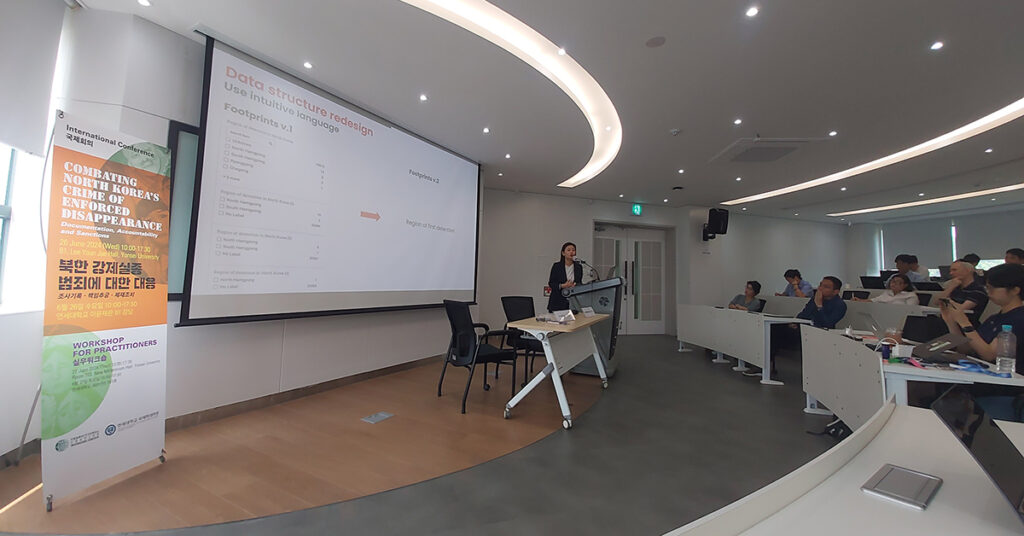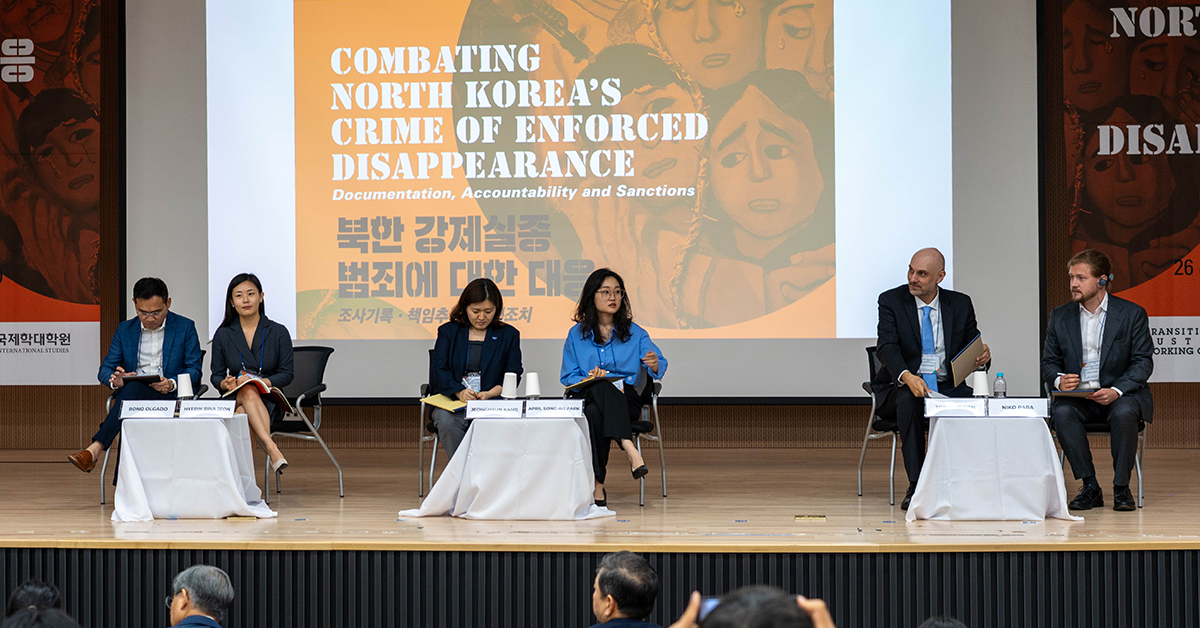Our long-standing partner, the Transitional Justice Working Group (TJWG), co-hosted the international conference on ‘Combating North Korea’s Crime of Enforced Disappearance: Documentation, Accountability and Sanctions’ with the Yonsei University’s Graduate School of International Studies. The conference was held on 26 June 2024 at Yonsei University in Seoul, Korea.
HURIDOCS’ Hyebin Bina Jeon, Programme Officer and Dr Bono Olgado, Senior Documentalist, were invited as guest speakers at the conference and presented an in-depth workshop for practitioners the following day.
International Conference
The conference aimed to deepen the understanding of North Korea’s crimes on human rights and how they can be combated through reliable human rights documentation for advocacy efforts, accountability mechanisms, and sanctions. Discussions centred on the integration of multi-source data and visualisations for advocacy, the role of courts, fact-finding and truth commissions, and the use of targeted sanctions and the naming of perpetrators to seek redress. t The event showcased the outcome of TJWG’s dedicated work over the past decade of documenting enforced disappearances in North Korea and other human rights violations.
A significant highlight of the conference was the launch of the Footprints 2.0 database, a collaborative effort between HURIDOCS and TJWG dedicated to documenting North Korean-enforced disappearances since the 1950s.
Bono and Hyebin Bina presented on HURIDOCS’ strategic role with partner civil society organisations to enhance their documentation efforts. They showcased the Afghanistan Memory Home as a unique example of memorialisation, DisappearED Asia as a simple and functional collective database that spans across seven different member organisations, and Zorla Kaybedilenler Veritabani, an example of content federation between a private and a public database. Bono also presented the Footprints 2.0 database, the goals and the challenges while developing the project, and how these required bespoke solutions, such as the accurate and efficient translation of a huge collection of data from Korean to English.
“With each new project and partner, we (HURIDOCS) carry forward the lessons learned from each of these projects, that is what we call solidarity-based development.
What we learn from our partners in Sri Lanka, enforces our work in Burma; the tools we develop for TJWG become the foundation for the solutions we offer in Sudan.
Through solidarity-based development, we iterate together as a global movement, learning from specific contexts and actors worldwide.”
Bono Olgado
Senior Documentalist, HURIDOCS
Other speakers included TJWG’s Footprints Project Team, Security Force Monitor, the UN Working Group on Arbitrary Detention (WGAD), the International Residual Mechanism for Criminal Tribunals (IRMCT) and more.
Watch the full conference:
Workshop for practitioners
The following day after the conference, the hosts organised a workshop for practitioners, aimed to provide tools and skills to diverse civil society organisations and human rights defenders working with documentation initiatives.
HURIDOCS kicked off the workshop with a presentation focusing on the critical role of data structure design in documentation. They aimed to enhance the understanding of how data structures impact human rights documentation and demonstrated this with a detailed case study of the evolution of Footprints 1.0 to Footprints 2.0 databases. Bono and Hyebin Bina also discussed theoretical considerations applicable to various documentation projects.
Other valuable sessions included Data Integration and Analysis by HRDAG, Data Visualisation by Security Force Monitor, International Prosecutions and Strategic Litigation by WGAD and, The Use of Universal Jurisdiction in Domestic Courts by FIDH.

“The Footprints project is a strong use case of our project lifecycle in action. The TJWG team placed their trust in us and followed through each step – from user needs discovery to data modelling, data clean-up, data migration and page visualisation. This project also pushed our capacities around automatic translation and data migration to a new level, sparking valuable discussions on various methodologies and support we can offer to accommodate unique informational and technical needs of our partners and their human rights documentation practices. ”
– Hyebin Bina JeonProgramme Officer, HURIDOCS
For more insights, watch the full workshop here:
